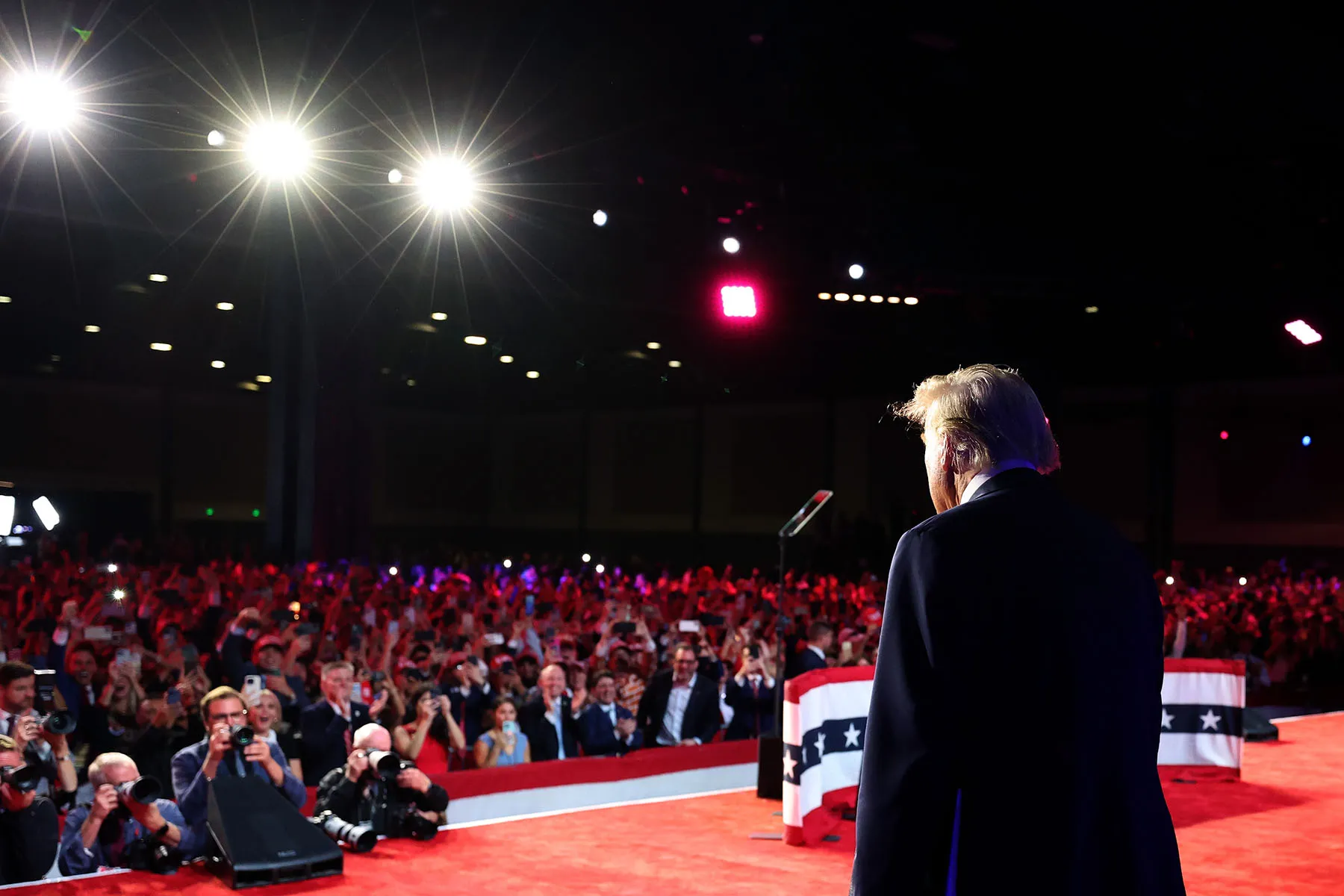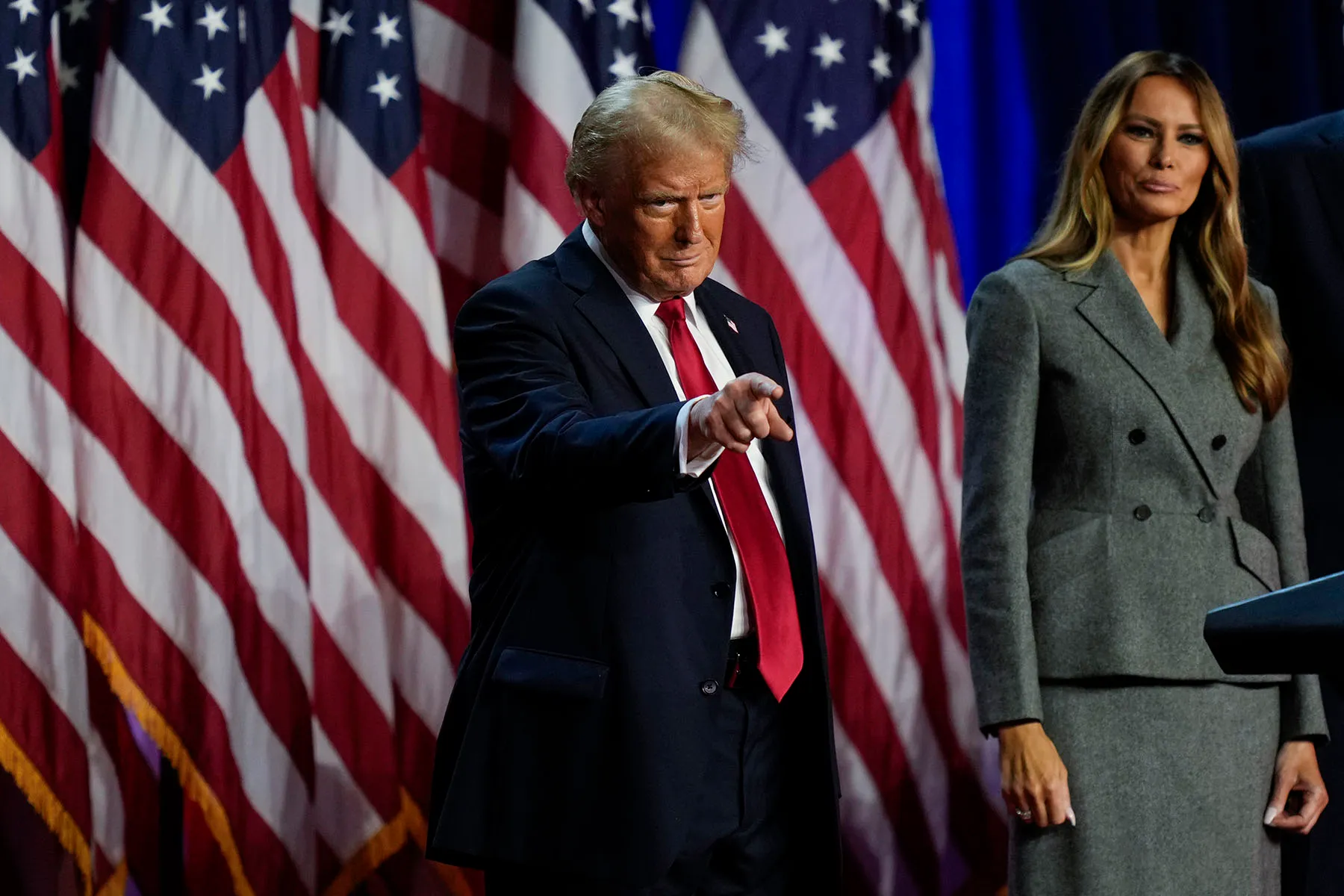Donald Trump has been elected the next president of the United States, following a campaign fueled by division, aggressive masculinity and xenophobia. His win sets the stage for a second administration during which he has promised to challenge the nation’s long-standing democratic norms to deliver on his vision for the country.
Following victories in the critical battlegrounds of Pennsylvania, Wisconsin, North Carolina and Georgia, Trump garnered the necessary Electoral College votes to win the presidency, according to Decision Desk HQ. Trump’s defeat of Vice President Kamala Harris marks the second time he has won the presidency over a candidate who would have become the country’s first woman president.
“America has given us an unprecedented and powerful mandate,” Trump said in a victory speech early Wednesday morning. “I will govern by a simple motto, promises made. Promises kept. We’re going to keep our promises. Nothing will stop me from keeping my word.”
Trump’s victory is a sign of an intensely polarized nation, one where voters weren’t asked to choose between different policy approaches, but rather competing visions for the future of the country, down to the studs: the integrity of its democracy, the rights of women and LGBTQ+ citizens, the treatment of immigrants, the nation’s role in averting climate change, the role of the government in preventing gun violence and educating children, and more.
In the first presidential election since the fall of Roe v. Wade, and following a campaign that saw Trump and his supporters stoke racism and xenophobia, a majority of women voters and voters of color backed Harris, according to exit polls, highlighting divisions along the lines of gender and race that will continue to define the next four years.
In the final days of the presidential campaign, Trump seemed to capture these clashing visions for the country in comments about the threat he believes immigrants pose to American women. “I’m going to do it, whether the women like it or not, I’m going to protect them,” Trump said during a rally in Green Bay, Wisconsin, recounting how advisers had discouraged him from using the line during speeches to voters.

Trump’s victory is the culmination of a tumultuous presidential election that saw Vice President Kamala Harris replace President Joe Biden on the Democratic ticket, kicking off a truncated campaign that gave her just over 100 days to make her case to the American people. Trump, who had easily defeated challengers for the Republican nomination early in the year, had long cemented his hold as the leader of a new, populist Republican Party and spent months deriding the Biden-Harris administration, often with distortions about the economy and personal attacks.
When Harris became the presumptive nominee, Trump’s attacks intensified: The former president took to calling Harris “stupid” and “mentally disabled” and falsely suggested she hadn’t always identified as Black. High-profile Trump supporters repeatedly used sexualized and racist remarks to attack the first woman of color to lead a major party ticket.
Harris’ closing message had implored voters to reject Trump’s bid, echoing the words of former Trump associates who cast him as a dire threat to American democracy. Harris also cast the election as a choice between two different styles of governance, telling voters she would seek to unite the nation around the ideals of freedom and democracy and work with lawmakers of both parties to deliver on her promises. In her campaign for the White House, Harris sought out Republican leaders and voters who said that while they disagreed with her views and policies on many issues, they viewed Trump as fundamentally unfit for office. Trump, they argued, was not worthy of the nation’s highest office because of his disregard for the rule of law, his thirst for vengeance and his puzzling — and obfuscating — style of communication.
Harris’ message failed to sufficiently penetrate where it mattered most.
Trump’s victory was immediately celebrated by supporters who say his brash style will benefit working-class Americans, halt the flow of new immigrants, protect the country from foreign enemies and promote conservative views on issues like abortion and gender identity at the federal level.
On the other side, the prospect of a second Trump term was received with shock and horror by Americans who fear they will become the targets of Trump’s policies and who believe his presidency could destabilize democracy in the United States.
A second Trump presidency could see him exert more power. People who claim to have served as guardrails or who publicly disobeyed Trump during and after his first term in office have left his inner circle and have been derided by Trump as disloyal. Trump will also enter the White House alongside Vice President-elect JD Vance, who, unlike Pence, has never held an executive office and hails from a younger, more populist wing of the party. Vance has said that, unlike Pence, he would not have certified the results of the 2020 election.
Trump’s second term will be different from the first in another way: The Supreme Court in July ruled that presidents can never be prosecuted for actions relating to the core powers of the presidency and that they have presumptive immunity more broadly for official acts, a sweeping expansion of presidential power.

Trump, 78, was a real estate developer in New York City who became a household name as a reality television star. Before he was elected president in 2016, he had no experience serving in government or the military.
Trump’s time in public life, including his presidential runs and tenure in office, has been marked by a slew of scandals, lawsuits and legal cases unprecedented for a president in the modern era. Trump was impeached twice in his first term, first on charges of abusing his office and obstructing Congress in his dealings with Ukraine and then again for inciting the January 6, 2021, insurrection of the U.S. Capitol. The Senate acquitted him both times.
In February, a judge ordered Trump to pay a $355 million fine in a civil fraud case brought by the New York attorney general against the Trump Organization. Then, in May, a Manhattan jury convicted Trump on 34 felony counts of falsifying business records to conceal a $130,000 hush money payment to the adult film star Stormy Daniels, who said she had an extramarital affair with Trump.
Trump faces charges in at least two other criminal cases: a sweeping racketeering probe into 2020 election interference in Fulton County, Georgia, and a federal investigation into the January 6 riot. A case over his handling of classified documents was dismissed, but that ruling has been appealed.
Trump has been accused of sexual misconduct by dozens of women for acts going back to the 1970s. Several women have described him forcibly reaching under their clothes and kissing them without consent. Last year, Trump was found liable for sexual assault by a jury in New York City after E. Jean Carroll, a writer, sued him for sexual abuse and defamation. In 2019, Carroll claimed that Trump had raped her in the dressing room of a high-end store in New York City in the late 1990s.
Trump has vehemently denied the allegations and repeatedly attacked the women who have brought the claims.
-
Read Next:
The most recent allegation against Trump came just two weeks before the election, when a woman named Stacey Williams told the Guardian that Trump had groped her at Trump Tower after the two were introduced by Jeffrey Epstein, who was charged with sex trafficking and later died by suicide.
In his own words, Trump has described groping women. In the infamous “Access Hollywood” recording that leaked a month before the 2016 election, Trump can be heard telling a TV show personality: “I’m automatically attracted to beautiful — I just start kissing them. It’s like a magnet. Just kiss. I don’t even wait. And when you’re a star, they let you do it. You can do anything. Grab them by the pussy. You can do anything.”
The existence of the tape was a surprise to some young voters who were not aware of Trump’s comments. In the final days of the 2024 campaign, Trump appeared to be reminded of it, too, jokingly alluding to it.
At a rally in Virginia on Saturday, talking about the mechanical arms that hold SpaceX rockets, Trump said: “You see those arms like you grab your beautiful baby, your beautiful child.
“In the old days, I would have said like you grab your — girlfriend,” Trump said. “Now I don’t say that anymore.” In North Carolina on Monday, Trump repeated the line adding, “See? Much better. Years ago I would’ve said something else, but I’ve learned.”
Trump’s first term in office was marked by high turnover among White House and agency staff. His administration did not repeal the Affordable Care Act, but sought spending cuts to Medicare, Medicaid and other welfare programs. The administration could not force the Mexican government to pay for a wall between the two countries, a key campaign promise, and his efforts to secure federal funding for the wall resulted in the longest government shutdown in history.
Trump oversaw a package of tax cuts in 2017 that disproportionately favored corporations and the nation’s wealthiest citizens, but those never resulted in the deficit reduction the administration had promised. When the COVID-19 pandemic hit, Trump and Democrats in Congress issued relief in the form of checks to individual families, a move fellow Republicans have since criticized.
When voters elected Biden to the White House in 2020, denying Trump a second term, Trump refused to concede the election, falsely claiming it was stolen from him through voter fraud. Trump urged his associates and allies to help him promote his claims and on January 6, 2021, told supporters gathered in Washington to “fight like hell” before a violent attack on the U.S. Capitol ensued. Trump has referred to January 6 as a “day of love” and has called the rioters “patriots.”
Trump will be the oldest person ever inaugurated as president of the United States and by the end of his term, he will be 82, surpassing Biden as the oldest person to serve in the role. Unlike Harris, Trump has not released medical records to the public despite saying months ago he would “gladly” do so.
When Trump is inaugurated for a second term, he will do so as a record-high share of Americans — 80 percent — say they believe the nation is “greatly divided,” according to an analysis by Gallup, which also found growing divisions on critical political issues. From the White House, Trump and his conservative allies will be able to exert power over the federal agencies, the courts and to some degree even the U.S. military to carry out his agenda.
Abortion
On reproductive rights, Trump has repeatedly said that the power to ban abortion is in the hands of state lawmakers and that he doesn’t support a national ban. But Trump allies and conservative leaders have also made it clear that they are studying all legal avenues to further restrict access to the procedure through the powers of the federal government, and anti-abortion advocates expect to have some influence over the administration.
Back in August, Trump said he is open to federal restrictions on abortion that would “supplement” state policy. When asked if he would use presidential power to restrict access to one of the drugs commonly used in medication abortion, his answer left observers guessing as to whether he was open to restricting mifepristone, which is used in about two-thirds of abortions, or simply didn’t understand what he was being asked.
About two-thirds of Americans, 63 percent, say abortion should be legal in all or most cases. About 57 percent of Republicans say the procedure should be illegal in all or most cases.
LGBTQ+ Rights
From the earliest days of his campaign, Trump has promised to use the power of the presidency to ban gender-affirming care for transgender youth and to investigate health care providers and pharmaceutical companies that offer such care. Trump and his allies have also put an intense focus on the participation of trans girls and women in youth sports, using the issue to stoke fear and anger among voters. Trump has said he would cut funding from schools that implement gender-affirming policies.
Trump’s first administration was widely characterized as one of the most hostile toward LGBTQ+ rights in modern history. During his four years in office, the administration barred transgender people from serving in the military, banned embassies from displaying Pride flags during Pride month, refused more funding for global HIV/AIDS prevention efforts, promoted exemptions that allow health care workers to turn away transgender patients, and outlawed the words “transgender” and “diversity” in Centers for Disease Control and Prevention data collection efforts.
Child care
Ivanka Trump, one of the president’s daughters, took a leading role in caregiving policy during his first term, pushing for paid leave and child care reform, but has since distanced herself from the former president and his third presidential campaign. Trump has not clearly articulated his plans for child care or paid leave.
Trump’s running mate, Vance, has called universal child care, or guaranteed access to child care subsidized by the government, a “massive subsidy to the lifestyle preferences of the affluent over the preferences of the middle and working class” and a “class war against normal people.” Vance, whose wife has a career in corporate law, has suggested most Americans would prefer that one parent or that grandparents care for young children.
Women face a heavier caregiving burden in the United States. While Americans widely support paid family and medical leave, there is significant division on how to secure it. For example, a Pew Research Center survey found that just as many Americans say the government should require employers to provide paid leave and that employers should be able to decide for themselves.
During the Trump administration, the government expanded the child tax credit, doubling it to $2,000 and making more of it refundable to lower-income families. Trump and Vance have supported keeping the credit and possibly expanding it.
Health care
Trump tried unsuccessfully to repeal the Affordable Care Act while in office, taking aim at the Obama-era law that barred insurers from denying coverage or charging higher premiums based on pre-existing health conditions and set a national standard for health insurance coverage, including maternity care. Trump has softened his rhetoric on a repeal, but said infamously during his debate against Harris that he had the “concepts of a plan” to replace the law. About 60 percent of Americans approve of the ACA, according to a recent poll. The same poll found that among Republicans, 66 percent view the law unfavorably.
Climate
Trump has taken to using, “Drill, Baby, Drill,” to sum up his energy policy promises. The former president has previously called climate change a “hoax” and his official 2024 campaign agenda makes no mention of it. Instead, Trump’s agenda says he will ramp up energy production and “make America the dominant energy producer in the world.” He also promises to cut “costly and burdensome regulations” passed during the Biden administration that reduce vehicle emissions and incentivize the production of electric cars. In April, Trump told oil and gas executives that he “hates wind,” referring to offshore wind projects, and that he would again speed up permitting for oil and gas projects.
Gun control
In a speech to the National Rifle Association in February, Trump told the crowd that “no one will lay a finger on your firearms” if he wins the presidential election and that he would terminate Biden administration regulations on gun owners and manufacturers. While 61 percent of Americans say they believe it is too easy to legally obtain a gun, just 34 percent of Republicans believe so, compared with 86 percent of Democrats.
Immigration
Trump has leaned heavily on immigration this campaign cycle, stoking animosity toward undocumented immigrants by casting them as threats to American women and claiming they are taking jobs away from U.S. citizens, pulling public school resources and housing away from American families, and “poisoning the blood of our country,” language linked to Nazi and white supremacist ideologies.
Trump’s plan for the estimated 11 million immigrants within the United States is to launch the “largest deportation in the history of our country,” using the military to detain and mass-deport undocumented immigrants. It’s not clear who exactly among them would be targeted and how they would be apprehended. During his first administration, Trump enacted a number of controversial measures to curb or discourage immigration, including banning travelers from several Muslim countries from entering the United States and separating parents and children who had illegally crossed the border.
The fate of undocumented immigrants will have important consequences for millions of families in the United States. A 2023 Pew Research Center analysis of available data found that one in every 20 U.S. households includes at least one person who is undocumented. The country is sharply divided on the fate of undocumented immigrants. A mid-September survey from Scripps News/Ipsos found that about 54 percent of Americans — 86 percent of Republicans, 58 percent of independents and 25 percent of Democrats — said they “strongly” or “somewhat” support a wide-scale effort to deport millions of immigrants.





